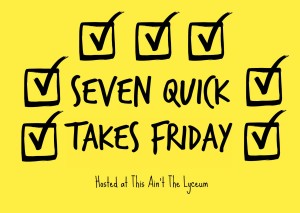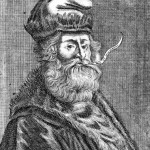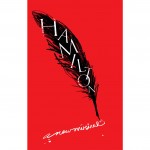If you’re sorry to have missed my talk in San Francisco on “Cultivating Openness to Truth” this week, tune into my radio show tomorrow at 5pm ET — I’ll be covering the highlights. And, for those of you who can’t catch the livestream, my program is beta-testing Real Life Radio’s downloadable podcasts, specifically because several of you wrote in to ask for that feature.
In three weeks, I’m really looking forward to attending Mary Stuart at the Folger and I’m especially looking forward to getting to browse though their “Decoding the Renaissance” exhibit. You non-DC folks can enjoy it vicariously through the NYT writeup:
Together, the Folger Library and the Library of Congress, a major lender to the exhibition, hold one of the world’s deepest collections of works on cryptography. This material constitutes the spine of the show, which sets forth the basic principles of code-making, a topic of fevered study during the Renaissance.
“It was a period of cold war, in effect,” said Bill Sherman, the head of research at the Victoria & Albert Museum in London and a professor of Renaissance studies at the University of York, who organized the exhibition. The Pan-European tensions between Protestant and Roman Catholic states, the rise of international trading systems and the newfound importance of diplomatic missions demanded spy networks, secrecy and subterfuge — “all the things you get in a John le Carré novel,” Mr. Sherman said.
While we’re on the subject of cryptography, I really enjoyed this story from Gizmodo on a coded message from World War II that was found hidden inside a bullet. The message, when decrypted, turned out to read:
THEY – THROW – GRENADES – WE – PULL – PINS – AND – THROW – BACK
NOTIFY REINFORCEMENTS STAND DOWN – NOT NEEDED
The reason the Americans were sending this message is very amusing, and you can find the explanation at Gizmodo.
Meanwhile, Cat at DarwinCatholic isn’t translating codes, but she is doing an equally finicky transformation of language while preserving meaning — translating poetry. She took on Cyrano’s Ballade (where he improvises a poem while dueling, promising to finish it and his opponent off simultaneously). Her post is a pleasure to read, as she discusses her approach:
A neutral course you scorned to steer,
To carve you, turkey, I’ll engrave
Your flank down there, or sleeve up here,
Or heart ‘neath path blue ribbons pave!
The strokes ring loudly, strong and brave!
The points fly as I whoosh, eh?
I know — my blow your gut will stave
When at the envoi’s end,touché!Stanza 2: I wanted to stay close to Cyrano’s neutre, and I wanted to keep the ridiculous word turkey, designed to prick his foppish opponent’s pride. Larder is a cooking technique which uses a larding needle to insert fat under a bird’s skin for juicier results; Brandon found a graceful way to keep the allusion, but I went with basting as a recognizable thing, and in the ABAB version I needed to use “carving” to fit with the “engrave” rhyme. Coquilles are handguards: the guards are ringing as strokes land on them, but I couldn’t quite make that work for me, and so ringing blades was the closest I could come to the sound of the bells, ding-don. What I really wanted to rhyme was paunch (bedon refers to skin stretched over a drum), so I had to work the fifth line back from “launch”. And of course, the awful rhyme for “touché” had to be fit in, though “whoosh” isn’t too far from voltige, quiver.
Brandon took on the poem too, with another delightfully nerdy writeup.
Most of us settle for reading Cyrano in translation, but native English speakers almost never have to settle for secondhand text in the science, since English has become the lingua franca for STEM scholars. Aeon explains why and looks back to the last language to dominate academia:
Aside from the rare oddball with overzealous parents (Montaigne claimed to be one), no one learned Latin as a first language and few used it orally. Latin was for written scholarship, but everyone who used it – such as Erasmus of Rotterdam – deployed it alongside other languages that they used to communicate with servants, family members and patrons. Latin was a vehicular language, used to bridge linguistic communities, and it was understood as more or less neutral. It excluded on class lines, to be sure, since it demanded more education, but it crossed confessional and political divides easily: Protestants used it frequently (often more elegantly than Catholics), and it was even imported as late as the 18th century into Orthodox Russia as the scholarly language of the newly established St Petersburg Academy of Sciences.
Perhaps most importantly, since Latin was no specific nation’s native tongue, and scholars all across European and Arabic societies could make equal use of it, no one ‘owned’ the language. For these reasons, Latin became a fitting vehicle for claims about universal nature. But everyone in this conversation was polyglot, choosing the language to suit the audience. When writing to international chemists, Swedes used Latin; when conversing with mining engineers, they opted for Swedish.
Last summer, I went to Rome, hoping to learn some of the secrets of Paideia. Some of the story I already knew: Pedicone and Hewett—and the colleagues they recruit each year—build from a single, shared experience that shaped their lives. All of them studied Latin with a legendary teacher, Reginald Foster, an American priest who worked for many years as a papal secretary, writing Latin documents. In Rome, many things change slowly, or not at all. Foster held the same position that the great Renaissance scholar Lorenzo Valla—famous for exposing the Donation of Constantine as a fake—occupied in the fifteenth century. He also shared the passion for Latin that inspired Valla to write the first modern analysis of classical Latin prose usage. For decades, Reginaldus—as generations of loving students called him—also taught Latin, for anyone who wanted to learn, at the Gregorian University during the academic year and in a separate program every summer. And he gave it a special twist.
Reginaldus could never stand the miserable, slow, passive way in which students in the modern world learn Latin. In Rome, as he has been known to say, things were different: “Every bum and prostitute in the city spoke Latin fluently.” From the start, he showed his students that they could do the same. Systematic exercises—all of which Reginaldus composed himself—made them use Latin actively, as they would use a modern language, from the first day. His pedagogy combined grumpiness, demands for improvement and occasional outbreaks of fury with an obvious love of students and Latin alike. Reginaldus labeled assignments ludi domestici, homeplay, rather than homework, and he meant it. Yet the play was serious, and incompetence provoked roars of denunciation.
A living language like English requires a fair amount of curation and care as well. Slate has a great profile on the people who edit the Merriam-Webster dictionary and the history of its revisions.
Most dramatically, Gove redefined Merriam’s defining style, banning the use of complete sentences. As lexicographer Ben Zimmer puts it, Gove-style definitions start “with a general category (or genus) followed by various distinguishing features (or differentiae),” in which commas are permitted only to separate items in a series. The resulting single statement must be replaceable—that is, it can be plugged into a sentence in place of the word it’s defining. An airplane, for instance, was defined by the Third as “a fixed-wing aircraft heavier than air” (genus) “that is driven by a screw propeller or by a high-velocity jet and supported by the dynamic reaction of the air against its wings” (differentiae).
Gove wanted to save space, paradoxically, so his dictionary could be as expansive as possible. Sometimes, the results were comical. Two of the Third’s most frequently mocked definitions are door, at 72 words, and weighing in at 91, hotel:
a building of many rooms chiefly for overnight accommodation of transients and several floors served by elevators, usually with a large open street-level lobby containing easy chairs, with a variety of compartments for eating, drinking, dancing, exhibitions, and group meetings (as of salesmen or convention attendants), with shops having both inside and street-side entrances and offering for sale items (as clothes, gifts, candy, theater tickets, travel tickets) of particular interest to a traveler, or providing personal services (as hairdressing, shoe shining), and with telephone booths, writing tables and washrooms freely available
Salesmen! Travel tickets! Shoe shining! The entry for oxygen is an even-more absurd 192 words long: “a nonmetallic chiefly bivalent element that is normally a colorless odorless tasteless nonflammable diatomic gas slightly soluble in water, that is the most abundant of the elements on earth occurring uncombined in air to the extent …” Take a breath and chuckle. But Merriam’s Stamper says that oxygen helped her get inside the minds of her defining predecessors.
“Before I started working on the Unabridged, I was very quick to pooh-pooh that [defining style] as, like, ‘This person is so full of themselves. They think they know everything about oxygen and they’re going to say everything they know about oxygen,’ ” Stamper tells me. “So I read something likeoxygen or hotel and they’re still pretty risible, they’re pretty laughable. … But I understand why the definer got to a point in looking at all of the evidence for oxygen, that they felt like, ‘If this is unabridged, then, goddamn it, it’s going to be unabridged.’”
Finally, Christian H. of The Thinking Ground (and a frequent commenter here) has a very enjoyable post on his efforts to translate the plot of a World Of Warcraft novel, trying to rearrange it chronologically for better effect.
A friend of mine has told me that she never reads novels in the order they’re presented. She skips between chapters, backward and forward; she doesn’t even read a page in order, but jumps all over it. And this is of course a way of approaching novels: if we imagine a novel as astructure, rather than a flow, then you can see how visiting parts in a different order is still sensible so long as you can keep track of how those parts relate. I asked if she is more likely to read something in order if it’s not a linear narrative, and she said she was somewhat more likely to, because then she feels as though the order is more deliberate and less arbitrary.** But, of course, most novels aren’t entirely linear; even absolute genre-trash skips around in time a little bit. Mystery novels are most notable for narrative time-travel: they almost always refer back to the past, or to several hypothetical pasts, over and over again, to the point of obsession. And it’s not just mystery novels: flashbacks (technical term: analepsis) are common in all genres. And there are popular films and novels that play with this. Memento, which happens in reverse order, seems to me a deliberate play on the mystery novel’s obsession with the past. The page to which “analepsis” links mentions that in the Harry Potter novels, the Pensieve—a magical device for experiencing another person’s memory as though it were currently happening—is a way of making flashbacks an in-world event rather than just a narrative technique. Once Upon a Time divides each episode between the present and the past, where the present (almost) always proceeds in order from episode to episode while the past jumps all over the place. These stories maintain a linear chronology as a frame, but within that frame they still skip about, and so non-chronological narratives seem more common than you might at first think.
For more Quick Takes, visit Conversion Diary!













